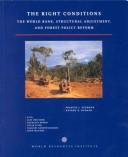| Listing 1 - 10 of 101 | << page >> |
Sort by
|

ISBN: 0802082262 Year: 2000 Publisher: Toronto : University of Toronto press,
Abstract | Keywords | Export | Availability | Bookmark
 Loading...
Loading...Choose an application
- Reference Manager
- EndNote
- RefWorks (Direct export to RefWorks)
Book
Year: 2000 Publisher: [Washington, D.C.] : The Office,
Abstract | Keywords | Export | Availability | Bookmark
 Loading...
Loading...Choose an application
- Reference Manager
- EndNote
- RefWorks (Direct export to RefWorks)
Book
ISBN: 1281995711 9786611995713 1442683791 9781442683792 Year: 2000 Publisher: Toronto
Abstract | Keywords | Export | Availability | Bookmark
 Loading...
Loading...Choose an application
- Reference Manager
- EndNote
- RefWorks (Direct export to RefWorks)
Since Zimbabwe's transition to black-majority rule in 1980, the political changes in that country have been the subject of much study and debate. In this cogent analysis, Hevina Dashwood traces the evolution of Zimbabwe's development strategy from independence to 1997. During this period, there was a fundamental shift away from the social-welfarist orientation of the original development strategy, a change that coincided with the introduction of the Structural Adjustment Programme in 1991. Dashwood traces the reconfiguration of the class structure in Zimbabwe, which led to the formation of a state-based bourgeoisie, whose interests are more closely aligned with those of the agrarian and entrepreneurial elites, rather than with the poor. Greater reliance was placed on market considerations and it became clear that the government was moving away from its earlier strong commitment to meeting the welfare needs of the poor. Dashwood argues that it was the class interests of the ruling elite, rather than pressure from the international financial institutions, that explains the failure of the government to devise a coherent, socially sensitive development strategy in conjunction with market-based reforms. This account of Zimbabwe's transformation sheds light on recent events in Zimbabwe as well as current debates on economic development throughout Africa.
Structural adjustment (Economic policy) --- Zimbabwe --- Economic policy.

ISBN: 9781569734247 1569734240 Year: 2000 Publisher: Washington (D.C.): World resources institute,
Abstract | Keywords | Export | Availability | Bookmark
 Loading...
Loading...Choose an application
- Reference Manager
- EndNote
- RefWorks (Direct export to RefWorks)

ISBN: 0120445557 Year: 2000 Publisher: San Diego (Calif.) : Academic press,
Abstract | Keywords | Export | Availability | Bookmark
 Loading...
Loading...Choose an application
- Reference Manager
- EndNote
- RefWorks (Direct export to RefWorks)
Book
Year: 2000 Publisher: Washington, D.C. : The Office,
Abstract | Keywords | Export | Availability | Bookmark
 Loading...
Loading...Choose an application
- Reference Manager
- EndNote
- RefWorks (Direct export to RefWorks)
Displaced workers --- Trade adjustment assistance --- Services for
Book
Year: 2000 Publisher: Washington, DC : World Bank, Research Advisory Staff,
Abstract | Keywords | Export | Availability | Bookmark
 Loading...
Loading...Choose an application
- Reference Manager
- EndNote
- RefWorks (Direct export to RefWorks)
Transition was never going to be easy, even with the highly promising long-run outlook. Not only was the process itself a major theoretical and policy challenge, but politics and economics were bound to interfere. And yet, with some spectacular exceptions, most countries are now on the right track.
Book
Year: 2000 Publisher: Washington, DC : World Bank, Research Advisory Staff,
Abstract | Keywords | Export | Availability | Bookmark
 Loading...
Loading...Choose an application
- Reference Manager
- EndNote
- RefWorks (Direct export to RefWorks)
Transition was never going to be easy, even with the highly promising long-run outlook. Not only was the process itself a major theoretical and policy challenge, but politics and economics were bound to interfere. And yet, with some spectacular exceptions, most countries are now on the right track.
Book
Year: 2000 Publisher: Washington, DC : World Bank, Poverty Reduction and Economic Management Network, Poverty Division,
Abstract | Keywords | Export | Availability | Bookmark
 Loading...
Loading...Choose an application
- Reference Manager
- EndNote
- RefWorks (Direct export to RefWorks)
Various social groups may oppose economic reforms such as currency devaluation, privatization of state firms, and the elimination of consumer (food) subsidies because of doubts about the benefitse of these reforms or because they believe that these reforms will harm their economic interests. Whether such opposition can stall reform depends on the aggregate political weight of the affected social groups.
Structural adjustment (Economic policy) --- Developing countries --- Economic conditions. --- Economic policy.

ISBN: 1282021281 9786612021282 0857020323 1849202850 9780857020321 9781446215319 1446215318 1873942133 9781873942130 9781282021280 6612021284 9781849202855 Year: 2000 Publisher: Bristol [England] Lucky Duck Pub.
Abstract | Keywords | Export | Availability | Bookmark
 Loading...
Loading...Choose an application
- Reference Manager
- EndNote
- RefWorks (Direct export to RefWorks)
The author uses research into the experiences of young people disaffected with school to provide a fascinating insight into the feelings and views of those who are hard to motivate. What we learn is that we might not like or agree with what we hear, but if we are to include these young people in our schools then we must listen to them.
| Listing 1 - 10 of 101 | << page >> |
Sort by
|

 Search
Search Feedback
Feedback About UniCat
About UniCat  Help
Help News
News